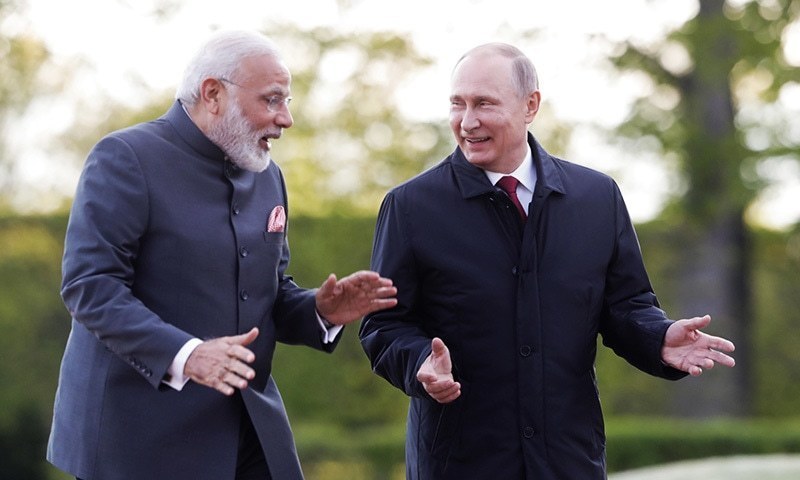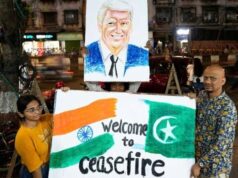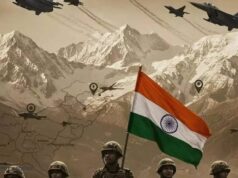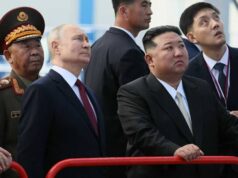India – Russia Relations Are Time Tested And Will Keep Growing stronger

By
Colonel Awadhesh Kumar, Special Forces
Hearing the periodic rattling of CAATSA “ Don Quixotic sabre “ of the Americans some Indians start thinking that Indo Russian friendship will start crumbling any time. So they start harping on the theme that the Sino-Russian links are far stronger than those between India and Russia. They are of the opinion that even if progress Is made in Russia-India relations it will not work for India. They caution that an India that is simultaneously Russia-friendly and America-friendly should be realistic about Russia’s international priorities.
Well, even during the Cold War Days, India neither joined the NATO / CENTO or the WARSAW pact. India remained friendly to both USA and Russia, though Nixon ‘s stupidity, amply demonstrated later on by USS ENTERPRISE led Task Force, made India more friendly with Russia.
Today, India is friendly with both USA and Iran, just like USA maintains friendly relationship with India and our irritant Pakistan. Both Israel and Saudi Arabia are good friends of India and so Air India from New Delhi to Tel Aviv flies over Saudi Arabia.
Thus it was not surprising that the first visit by Foreign Secretary Harsh Shringla on 17–18 February outside South Asia during the current corona crisis was to Moscow. This truly gives out the importance India attaches to its strategic partnership with Russia. This friendship is time tested and independent of Moscow’s ties with Beijing and the shifting dynamics of global power. Today India’s competition with China may be growing, may be causing even discomfort to China, but the BRICS is growing into a powerful economic/ cultural institution day by day. The mainstay of this are Russia, China and India.
Russia’s arms sales to India have been an important plank of the bilateral relationship since the former USSR and India first signed a deal in early 1960s for the venerable MiG21s and soon thereafter for the Foxtrot Submarines. More than 60% of India’s defence forces are presently equipped with Russian weapons. Today India manufactures its own nuclear submarines thanks to INS CHAKRA given on lease by USSR in mid 1980s.
Both countries are also cooperating in the manufacture of the “Brahmos” missile system a world beater and licensed production in India of SU-30 aircraft and T-90 tanks. They will soon be jointly manufacturing AK-203 rifles, with full technology transfer. India’s decision to buy Russia s S-400 missile system – providing India with the most advanced and sophisticated anti-aircraft / anti missile weapon – reflects The close bonding.
India has knowingly selected the S400 system even when China too has purchased the same S-400 system. This system is unmatched by any other system in the world. India is going ahead with the purchase even when USA is trying to threaten it with that funny law of theirs called CAATSA. At the same time Beijing’s recent territory-grabbing push in the Himalayas has given an impetus to faster induction of this missile system and may also lead to few more ships / submarines with Russian collaboration. China had to finally back down in Ladhak, and Even CAATSA will boomerang on the American defence industry itself, if they try it out on India.
India-Russia trade and connectivity may be presently lagging behind those between China and Russia but is catching up. Trade between Russia and India amounted to Rs 80000 Crores in 2019–20 and both countries have further invested in each other’s oil and gas sectors. They have set a bilateral trade target at Rs 250000 Crores by 2025. Though it may be nowhere near Russia-China trade, but soon India is going to become the third largest economy even in dollar terms and much bigger in PPP terms.
In 2019 a plan for a maritime corridor between Chennai in India and Vladivostok in Russia was formalised. The route Knowingly passed through the So called South China Sea and will increase India’s economic involvement in the Russian Far East. It was for nothing that the India China Summit was held at Mahabalipuram on the Tamil Nadu Coast. It was from that port, the Great PALLAVAS had ruled and dominated the entire South East Asia and the Indo Pacific. India also extended Rs 7500 crore line of credit for the Russian Far East, the area comprising one third of Russia, rich in minerals, hydrocarbons, timber and fish. Recently Russia expressed its thanks in Indian investment in the region.
Naturally Russia was alarmed with New Delhi involvement in the Quad with –the US, Australia and Japan to maintain an open rules-based Indo-Pacific. This was due to the fact that the Americans had started tom tomming the Quad as a military alliance on the lines if NATO. Moscow thus saw the Quad and Indo-Pacific concept as hostile to the interests of Russia and China. However India has clearly ruled out Quad as a military alliance. In fact India has invited Russia also to participate in the Indo Pacific initiatives.
Today India is rising and with Russia and China, all three have always favoured multipolarity. Russia’s longstanding aim has been to shift the post-Cold war global system away from an American dominated order. India too envisions a “multipolar World ” where major and minor powers have equal standing in decision-making. In Spite of the GDP figures put out by the world bank, the US NO more can play the role of the sole unquestioned superpower. Russia and China are competitors and India will not bow to any ones WILL.
Some Indians think that US is the country most likely to help India against China’s territorial aggression and Russia will remain neutral. In fact, China’s belligerence in South and Southeast Asia shows that it is USA which needs India to bail it out both in the Indo Pacific and the Indian Ocean Region.
So Washington should be careful in imposing any terms on India in return for helping India to confront China, as New Delhi will seek to strengthen its ties with Moscow and will follow its own independent path.




